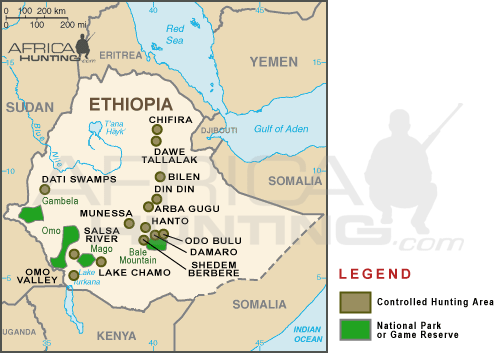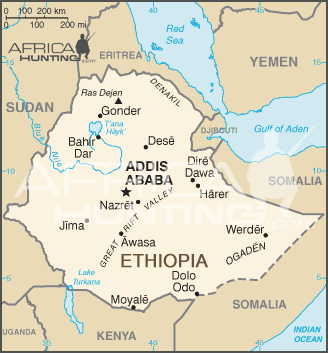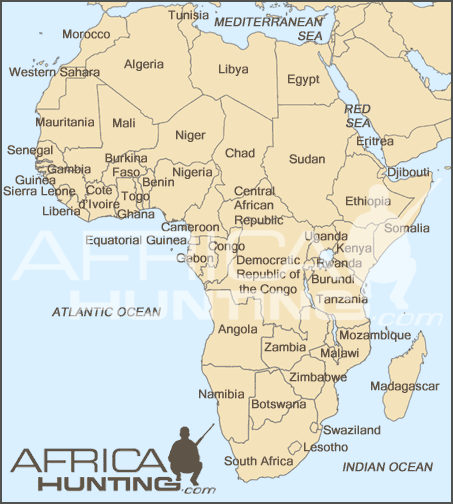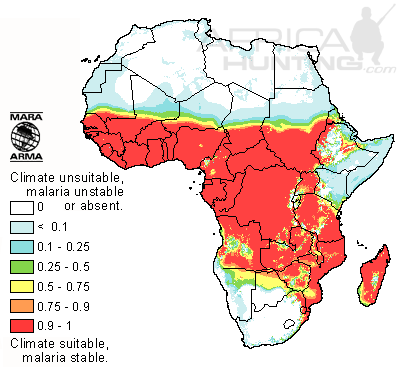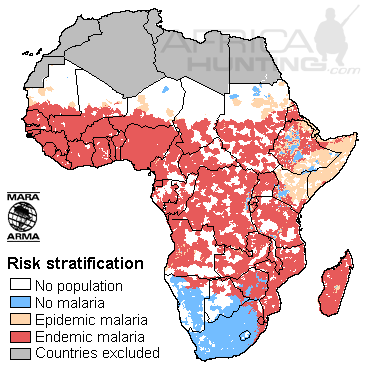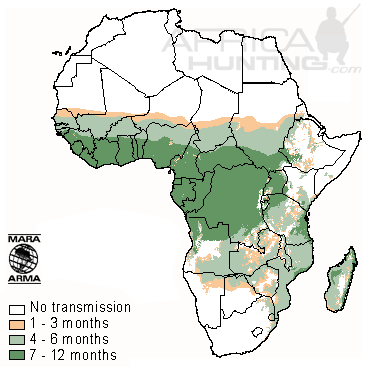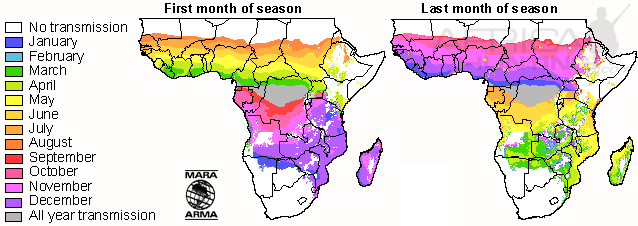- Joined
- Oct 1, 2007
- Messages
- 13,085
- Reaction score
- 9,184
- Website
- www.africahunting.com
- Media
- 5,597
- Articles
- 321
If you notice that anything in this article needs to be updated or anything is incorrect or incomplete please help us keep it current by letting us know.
ETHIOPIA Hunting Information

 Hunting Ethiopia
Hunting Ethiopia
Ethiopia covers a large portion of the Horn of Africa and shares borders with Sudan, Kenya, Somalia and Djibouti. For decades Ethiopia has been a legendary hunting destination, especially famous for its Elephants. It is also the only country in which one can find the Moutain Nyala as well as hunt the iconic Bongo or Markhor which are as beautiful and exciting as they are challenging.

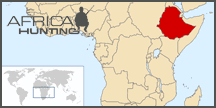
Despite numerous political crisis and wars waged in the last twenty years, Ethiopia, unlike its neighbor Somalia, offers unique hunting possibilities in exciting and fascinating geographical regions.
Ethiopia has been celebrated by such famous writers as Raimbaud, Henry de Montfreid and Fran霈殃s Guyot and it is useful to read the works of these authors before beginning a journey to this country. Even though these books have been written decades ago, they enable today's hunter to more fully experience the atmosphere of this beautiful country.
In addition to the magnificent Mountain Nyala (Tragelaphus Buxtoni), Ethiopia is home to a varied wildlife spread out over different regions in the country that include the following, the Greater Kudu (Tragelaphus Strepsiceros), Lesser Kudu (Tragelaphus Imberbis), Beisa Oryx (Oryx Gazella Beisa), Nile Buffalo (Syncerus Caffer Aequinoxialis), Neumann's Hartebeest (Alcelaphus Buselaphus Lelwel), Defassa Waterbuck (Kobus Defassa), Harnessed Bushbuck (Tragelaphus Scriptus), Gerenuk (Litocranius Walleri), Bohor Reedbuck (Redunca Redunca), Grant's Gazelle (Gazella Grantii), Soemmering's Gazelle (Gazella Soemmeringi), Oribi (Ourebia Ourebi), Klipspringer (Oreotragus Oreotragus), Kirk Dik-Dik (Madoqua Kirki), Gunther's Dik-Dik (Madoqua Guentheri Smithi), Giant Forest Hog (Hylochoerus Meinertzhagenii), Bushpig (Potamochoerus Porcus), Warthog (Phacochoerus Aethiopicus).
Among the predators are the distinguished Black-Backed Jackal (Canis mesomelas), Side-Striped Jackal (Canis Adustus) and Spotted Hyena (Crocuta Crocuta). Lions and Leopards are also available to hunt in Ethiopia and are present in large numbers. Hunting Lion is only done by tracking. Ethiopia issues more licenses for hunting Leopards than any other country in Africa.
Hunting in Ethiopia follows specific rules. A species can only be hunted in those areas that have been designated for hunting that particular species. Unfortunately for hunters interested in hunting Elephant or the Neumann's Hartebeest, these species can be hunted in theory only, no land has been designated for their hunting in Ethiopia as of yet.
There is no hunting season in Ethiopia and therefore it is theoretically possible to hunt all year round. The best time of year for hunting Ethiopia is from October through June. The months of July, August and September can be particularly wet.
The hunting areas in Ethiopia are spread out over a large portion of the country. The larger areas are mainly located in the southern half of the country and south of the capital, Addis Ababa. The Omo Valley, Bale province, Arusi mountains and Bale Mountains to the south as well as the Danakil region and the Afar region to the north are the most frequented hunting areas.
The hunting areas in Ethiopia are open territories, not fenced. Hunting concessions are leased and managed by hunting outfitters. There are less than half a dozen hunting outfitters in Ethiopia and the professional hunters are mostly English speaking (American, South African or white Zimbabwean).
Hunting in Ethiopia is done on foot except for the Mountain Nyala for which hunting is most often done on horseback. It should be known that Mountain Nyala hunting can be very physically demanding and is similar to hunting sheep or Bongo. It is often described as a "vertical" Bongo hunt due to the difficulty negotiating the terrain. While hunting Mountain Nyala, flying camps are often the standard. Elsewhere in Ethiopia the hunting camps are tent camps and are usually large and quite comfortable.
The hunting areas are accessible only by road from Addis Ababa and the drive is on average 5 to 10 hours depending upon the location of the area you will be hunting and the road conditions.
 Finding a Hunting Outfitter in Ethiopia
Finding a Hunting Outfitter in Ethiopia
The single most important thing you need to do to ensure that you are booking with a good hunting outfitter is check their references. The outfitter should provide you with more than a few references, especially clients who have hunted with them within the last year and you should call many of them.
Click here to check out our Ethiopia Hunting Reports, a section where you can find or post more detailed Hunting Reports. Or visit our forums where you can interact with other hunters and industry professionals, post questions or read what others are discussing about hunting in Ethiopia by clicking here.
We are all empowered by learning from each other and we encourage you to make educated decisions based upon honest information and real experience.


Ethiopia Hunting Areas Map and Satellite Imagery
Click here for Ethiopia hunting areas map, country and satellite imagery maps.
 Climate in Ethiopia
Climate in Ethiopia
There are three main seasons in Ethiopia, with temperatures depending on the altitude. The lowlands are generally hot and humid, with cooler temperatures in the Ethiopian Highlands. The dry season runs from October to May and is the most pleasant time to visit, while June to September is the rainy season.
There are three main seasons in Ethiopia, with temperatures depending on the altitude. The lowlands are generally hot and humid, with cooler temperatures in the Ethiopian Highlands. The dry season runs from October to May and is the most pleasant time to visit, while June to September is the rainy season.
Ethiopian climate varies according to the different topographical regions. The central plateau has a moderate climate with minimal seasonal temperature variation. The mean minimum during the coldest season is 6DC (43DF), while the mean maximum rarely exceeds 26DC (79DF). Temperature variations in the lowlands are much greater, and the heat in the desert and Red Sea coastal areas is extreme, with occasional highs of 60DC (140DF). Heavy rainfall occurs in most of the country during June, July, and August. The High Plateau also experiences a second, though much milder, rainy season between December and February. Average annual precipitation on the central plateau is roughly 122 cm (48 in). The northern provinces receive less rainfall, and the average annual precipitation in the Ogaden is less than 10 cm (4 in). The westernmost region of Ethiopia receives an annual rainfall of nearly 200 cm (80 in). Severe droughts affected the country in 1982?4,1987?8, and 1991.
Weather Underground provides a very detailed look at current weather conditions, weather forecasts, a history and almanac for predicting average weather conditions during the time while you will be traveling in that part of the world. Click here for Ethiopia's climate and temperature forecast.
 Ethiopia Hunting Season & When Hunting is Allowed
Ethiopia Hunting Season & When Hunting is Allowed
- Hunting Season - January 1st to December 31st (all year round)
- Trophy hunting is allowed throughout the year with the one exception of the Nile Crocodile that is restricted to be hunted only from May 1st to November 30th as they lay their eggs the rest of the year.
- Trophy hunting may take place within the hours of daylight during the hunting season.
- Hunting is allowed at night with artificial light but only for nocturnal species such as Lion, Leopard, Hyena, Jackals and smaller cat species such as Serval and Genet. The Giant Forest Hog does is not classified under nocturnal species and therefore cannot be hunted at night.
- The Ethiopian government strictly controls the minimum number of days for a hunting safari based upon the species being hunted. Above and beyond the government regulations, the hunting outfitter may also impose their own guidelines as to the minimum number of days required to hunt certain species or combination of species.
- A 21 day hunting safari is the minimum number of days required to be able to hunt Mountain Nyala or dangerous game.
- A 15 day hunting safari is the minimum number of days required to be able to hunt any other species available on a hunting license.
- A maximum of one trophy per species may be harvested, per hunting client per hunting permit with the exception of Warthogs, Bushpigs and Baboons while on a Leopard or Lion hunt as these animals may be used as bait.
- Hunting of female is prohibited. Should such animal be taken, the professional hunter will be fined double the license fee, however the trophy can still be exported.
- Based on the SCI record book minimum scoring system the minimum legal trophy size is to be reached. Should an animal be taken under the minimum score, the professional hunter will be fined a 25% penalty fee on the license fee, however the trophy can still be exported.
- All animals are subject to quota availability.
- Baiting with domestic animals is not permitted.
- Hunting with dog(s) is not permitted.
- Bowhunting is permitted.
Ethiopia defines two categories of land where hunting is permitted; controlled hunting concessions which will give the sole hunting right to one outfitter and open hunting areas which will give the hunting right to the outfitters who financially contribute to the area and share the allocated quota.
You will find information about the bird hunting season in Ethiopia near the bottom of this page.
 Species to Hunt in Ethiopia
Species to Hunt in Ethiopia
Ethiopia offers a good selection of species for trophy hunting, including the famous Mountain Nyala, probably the most revered spiral horned antelope. Ethiopia also offers a large variety of species, however it is not because a species is available through a hunting license that this species is available on quota anywhere in the country.
Click here to visit AfricaHunting.com complete list of species available to hunt in Ethiopia.

Shot Placement Guide for the Perfect Shot
Click here to visit our shot placement guide, the most comprehensive shot placement guide of African game online.
 Bowhunting in Ethiopia
Bowhunting in Ethiopia
Bowhunting in Ethiopia started in 2005 and the government of Ethiopia does not have any restrictions on species hunted with a bow. This country offers tremendous opportunities for bow hunters however few operators have the experience to conduct bowhunting safaris, so careful selection of the hunting outfitter is very important.
Ethiopia does not have an additional bow qualification for professional hunters.
 Importation of Bows & Arrows into Ethiopia
Importation of Bows & Arrows into Ethiopia
It is legal for hunters to import bows for bowhunting purposes into Ethiopia and no import permit is required.
 Minimum Equipment Requirements for Bowhunting in Ethiopia
Minimum Equipment Requirements for Bowhunting in Ethiopia
Ethiopia does not have any minimum equipment requirements for bowhunting so common sense will apply or here below find the requirements for South Africa.
- Big Game
Bow Kinetic Energy 80 ft/lbs
Arrow Weight 700 grain
(Elephant, Rhino, Hippo, Buffalo)
- Medium Game
Bow Kinetic Energy 70 ft/lbs
Arrow Weight 550 grain
(Kudu, Eland, Oryx / Gemsbok, Hartebeest, Wildebeest, Zebra, Giraffe, Sable Antelope, Roan Antelope, Waterbuck, Tsessebe, etc.)
- Small Game
Bow Kinetic Energy 40 ft/lbs
Arrow Weight 400 grain
(Warthog, Nyala, Springbok, Impala, Blesbok, Duiker, Steenbok, Ostrich, Caracal, Black-Backed Jackal, Game Birds, etc.)
 Minimum Equipment Requirements for Rifle Hunting in Ethiopia
Minimum Equipment Requirements for Rifle Hunting in Ethiopia
- There is no minimum equipment requirement for rifle hunting in Ethiopia.
- Ethiopia does not require a minimum energy (Eo - muzzle velocity) for calibers used.
 Traveling with Firearms & Ammunition
Traveling with Firearms & Ammunition
Traveling to Africa usually requires taking at least a couple of different airlines as well as departing from several countries whose laws and regulations are constantly changing. And they all have their own rules, regulations and laws for which it is your responsibility to be aware and in compliance with all of them. For this reason you should read the Africa Hunting article on Laws & Regulations for Hunters Traveling with Weapons by clicking here.
 Permits & Importation of Firearms & Ammunition into Ethiopia
Permits & Importation of Firearms & Ammunition into Ethiopia
The following section contains the basic information you will need to know, for more detailed information you should read Africa Hunting article on Importation or Transiting Procedures Through Countries with Weapons by clicking here, especially if you are transiting through or traveling to another country.
- Temporary importation of firearms and ammunition into Ethiopia is NOT free of charge, please check with your outfitter as to the current charges. The process is usually quick and easy.
- Your hunting outfitter will send you a form to fill out and return to them so they can arrange for your firearms and ammunition temporary import/export permits months prior to your arrival as required by the government of Ethiopia. This permit will be based upon the firearm information you provide to your outfitter so it is very important that you carefully consider which firearms you will be bringing with you, as once you have submitted the form you will not be able to change your mind. It is very important that all weapons serial numbers be exactly the same when you arrive as what was issued on your import/export permit. Last minute changes of mind cause more problems regarding gun permits than any other reason. Exact number of ammunition is also important.
- A hunting license can only be purchased from the Wildlife Department once the necessary temporary importation of firearms and ammunition permit(s) has been issued by the Ministry of Internal Security in Ethiopia.
- In the event the hunting client chooses to use a firearm(s) from the hunting outfitter, required firearms and ammunition permit(s) has still to be applied for by the hunting outfitter and issued by the Ministry of Internal Security in Ethiopia before a hunting license can be purchased from the Wildlife Department.
- There is a limit of three firearms per hunter that may be imported into Ethiopia for trophy hunting purposes.
- A maximum of one hundred and twenty (120) rounds of ammunition may be imported per hunting rifle and two hundred (200) shells of ammunition per shotgun, however you may encounter greater restrictions from the airline(s) you are traveling on or country you are departing from or other countries you may be visiting or transiting through. For more information on this topic, read the Africa Hunting article, Laws & Regulations for Hunters Traveling with Weapons by clicking here.
- Only ammunition for the specific caliber(s) you are bringing may be imported.
- No automatic, semi-automatic firearms are allowed. Semi-automatic shotguns are allowed.
- No weapons which fall under military categories.
- Handguns are allowed for hunting purposes. A special permit which the safari operator must apply for well prior to the start of the hunt can be requested. This special handgun permit comes at a cost.

Need help traveling to or through South Africa with your guns?
South Africa is the number one hunting destination in Africa and most safari hunters will at least transit through South Africa even if they are not staying in the country to hunt. That's why the services of riflepermits.com are so valuable. They can help you navigate the stressful and cumbersome process of transiting or importing your guns into South Africa making it easy and less time consuming.
riflepermits.com work hand in hand-in-hand with the South African Police Services (SAPS) to provide import/export or in-transit permits for your firearms before you even arrive in South Africa. They will hand deliver your pre-authorized permit to you on arrival and also guide you through the procedure at the SAPS Permit Office making it as hassle free as possible.
They also have rifle storage facilities for those who just want to do a bit of traveling or sight seeing in South Africa as well. They can help make your hunting safari a great experience from start to finish!
For more information visit their website!

Henry Durrheim
riflepermits.com - QUICK & EASY arrival with your firearm in South Africa! We'll meet you and escort you through it...
henry@riflepermits.com
www.riflepermits.com
 Ethiopia Professional Hunters Association
Ethiopia Professional Hunters Association
There is no Professional Hunters Association in Ethiopia.

Association of Bid Game Professional Hunters (AGGC - Association des Guides de Grande Chasse)
Many professional hunters in the former French colonies in Africa are French nationals and members of the Association des Guides de Grande Chasse. Click here to visit ACP web site for more information.

Association of Professional Hunters in France (ACP - Association des Chasseurs Professionnels)
Click here to visit ACP web site for more information.
 Ethiopia Hunting Permits & Licenses
Ethiopia Hunting Permits & Licenses
The wildlife authorities and the government of Ethiopia allocates quotas by species to each controlled hunting concessions and open hunting areas on an individual basis.
Your hunting license and permit will be applied for and obtained by your hunting outfitter well prior to your arrival, please check with your outfitter as to the current charges or if the cost of this paperwork is already included in the price of your hunt.
The following is required regarding permits for trophy hunting in Ethiopia:
- A maximum of one trophy per species may be harvested, per hunting client per hunting license, with the exception of Warthogs, Bushpigs and Baboons while on a Leopard or Lion hunt as these animals may be used as bait.
- Clients are only permitted to hunt animals for which a license is issued.
- Hunting licenses cannot be transfered or refunded and they have to be paid prior the commencement of the hunt.
- All animals are subject to quota availability.
- Permits must be issued prior to the hunt commencing.
- A separate permit must be issued for each individual hunting client.
- While hunting on an open hunting areas a 10% surcharge on license fee will be payable.
- License fee for killing or wounding of female, young and/or immature animals is double the standard license fee for that species.
- License fee for killing or wounding of trophies that do not reach the minimum score is fined a 25% penalty fee on the license fee for that species.
- Clients are expected to abide by all Wildlife Hunting Regulations in Ethiopia.


CITIES Permits & U.S. Fish & Wildlife Service
The importation of some individual sport hunted trophies requires a CITES permit (i.e. African Elephant, White Rhinoceros and Leopard to name a few), you will need to submit an application to the U.S. Fish & Wildlife Service if you are planning to import any of the species on their list. You can download the CITIES permit application forms by clicking here. CITES stands for Convention on International Trade in Endangered Species of Wild Fauna and Flora, visit their web site at www.cites.org.

Shipping & Importing Your Hunting Trophies Back
I highly recommend that when it come to the intricacies of importing your hunting trophies do yourself a favor and hire experts to facilitate the process. Allan Zarach from TROPHY SHIPPERS (www.trophyshippers.com) offers an incredible service at a great price.
TROPHY SHIPPERS is a family owned company and have been in business since 1981. They are a customs brokerage and freight forwarding company that is dedicated to helping hunters quickly and efficiently get their hunting trophies home. They know what your hunting trophies mean to you, because they are a family of hunters themselves. If you have trophies that you need brought back to the United States or are planning a trip to Africa to hunt or anywhere in the world, let TROPHY SHIPPERS handle all of the paperwork, clearances, and shipments for you!
They truly provide an invaluable full service for managing an increasingly more detailed and complex process for the importation of your trophies from start to finish. If you would like to contact them, TROPHY SHIPPERS can be reached at Cell/WhatsApp +1 (847) 927-0101 / Office +1 (630) 595-7300, or via their website www.trophyshippers.com, click here.

 The Safari Planning Guide
The Safari Planning Guide
Click here to visit the Africa Hunting Safari Planning Guide, or click the direct links below to visit the individual articles in this section with many useful resources to help you plan and prepare for your African hunting safari:
- Hunting Safari Preparation Timeline
- Safari Planning Resource Guide
- Why You Should Always Use A Hunting Travel Agent!
- Travel, Medical & Evacuation Insurance
- Why You Should Use A Hunting Trophy Shipping & Importation Specialist!
- What You Need to Know About Packing
- Clothing & Footwear List
- Personal Items & Toiletries List
- Hunting Gear List for Rifle Hunters
- Hunting Gear List for Bow Hunters
- Travel Documents & Money
- Tipping Guide
 Camouflage
Camouflage
Camouflage clothing is allowed in Ethiopia during the actual hunt. I would advise that it only be worn during the hunt and not in town or for travel.
 How to Get There
How to Get There
A majority of international hunting clients will fly from their country of origin into Ethiopia on a major international airline via Paris which offers direct flights to Bole International Airport in Addis Ababa.

Travel Agent Specializing in Hunting Clientele
You may wish to consider using a travel agent that specializes in hunting worldwide or in Africa as they may be familiar with these routes and used to working with these airlines. Specialty travel agents can often get better deals than you can find on major websites or through regular travel agents. I highly recommend TRAVEL EXPRESS, hunting travel specialists, they are the company that I personally use. Jennifer Ginn can help you, she is very knowledgeable and a hunter herself. She can assist you with all aspects of your hunting travel planning from airfare, lodging and car rentals to entry visa's, firearm permits, etc... Click here to visit TRAVEL EXPRESS website www.TravelExpressAgency.com.

 International Airport in Ethiopia
International Airport in Ethiopia
- City: Addis Ababa - capital of Ethiopia
Bole International Airport
Airport Code ADD
Located 5 miles (8 km) southeast of the city of Addis Ababa
 Major Airlines Flying into Ethiopia
Major Airlines Flying into Ethiopia

Ethiopian Airlines
www.ethiopianairlines.com

Air France
www.airfrance.us
 Travel Information
Travel Information
Click here to view the Africa Hunting travel information section, or the direct links below, with many useful articles and resources to help you plan your travel for your African hunting safari, including:
- Importation or Transiting Procedures Through Countries with Weapons
- Laws & Regulations for Hunters Traveling with Weapons
- Airports & Airlines
- Value Added Tax (VAT) Refunds
- Embassies & Consulates
 Visa & Travel Documents
Visa & Travel Documents
All foreigners must be in possession of a passport that will remain valid for at least six months after the intended date of departure from Ethiopia as well as a round trip airline ticket.
To find out if you need to apply for a Visa in advance, a great resource with free information is Travel Document System (TDS) at www.traveldocs.com. If you are in need of a visa, Travel Document System is nationally recognized as a leading authority in the field of international Travel Documents. Travelers are quite often not sure of the specific requirements or documentation required to enter into a foreign country. TDS helps international travelers easily understand what is specifically required of them in order to gain passage into another country and provides visa services for U.S. citizens to most countries for which an entry visa is required www.traveldocs.com.
 Traveler's Health & ImmunizationsA valid yellow fever inoculation certificate or International Health Certificate including yellow fever proof of vaccination is required upon arrival from all countries to enter Ethiopia.
Traveler's Health & ImmunizationsA valid yellow fever inoculation certificate or International Health Certificate including yellow fever proof of vaccination is required upon arrival from all countries to enter Ethiopia.
CDC recommends that you see a health-care provider who specializes in Travel Medicine. Find a travel medicine clinic near you by clicking here. If you have a medical condition, you should also share your travel plans with any doctors you are currently seeing for other medical reasons.
Recommended Vaccinations Include:
- Hepatitis A
- Hepatitis B
- Typhoid
- Meningococcal Meningitis
- Rabies
- Tuberculosis
- Routine vaccination if you are not up-to-date including Influenza, Polio, MMR (measles/mumps/rubella) and DPT (diphtheria/pertussis/tetanus)
Malaria prophylactics medication is highly recommended and should be considered as mandatory, however we suggest that you visit the Center for Disease Control & Prevention (CDC) for their recommendations for travel in Ethiopia as mosquitoes in this country are resistant to some antimalarial drugs.
The CDC is most credible online resource for up to date health information. Click here to visit the section dedicated to Traveler's Health specific to Ethiopia. Information about vaccinations, diseases, prevention, tips and much more can be found here.

Malaria Map of Ethiopia
Click here to enlarge Ethiopia malaria map.

Malaria Maps of Africa
Click here for Africa malaria maps, distribution model, endemic / epidemic risk areas, duration of malaria transmission season and duration of malaria transmission season.

Emergency Evacuation and Field Rescue Membership
No matter if it's your first or fifth time hunting in Africa, unavoidable accidents do happen. Whether a medical or security emergency, an evacuation from a remote part of Ethiopia could cost well over $100,000. I strongly recommend that anyone traveling to Ethiopia purchase a membership with Global Rescue, the only crisis response company that provides hunters with medical and security evacuation and consultation services anywhere in the world, even the most remote areas. Their deployable teams of paramedics and special operations veterans, backed by on-staff physicians and the specialists at Johns Hopkins Medicine, will get to you wherever you are, by any means necessary, and evacuate you all the way to your home country hospital of choice.
Member benefits include:
- 24hr medical advisory services from critical care paramedics and in-house physicians
- Specialists at Johns Hopkins Medicine available in real-time
- Field Rescue from the point of illness or injury
- Evacuation back to the member's home hospital of choice
- Global network of medical Centers Of Excellence
- Deployable medical and security teams
- Evacuation services provided up to $500,000
Memberships start at $119
If you would like to purchase a membership or have additional questions, Global Rescue can be reached anytime at +1 (617) 459-4200, or via www.globalrescue.com, click here.

Travel Advisory from The U.S. Department of State, Bureau of Consular Affairs
What you should know before you go. You may obtain international travel information by country, warnings for travelers about crime and public announcements about travel abroad in addition to so much other valuable information http://travel.state.gov.
 Embassies & Consulates
Embassies & Consulates
Ethiopia Embassy in the USAwww.ethiopianembassy.org
Click here for a complete searchable database of all embassies and consulates from every country in the world including Ethiopia.
 Bird Hunting Season in Ethiopia
Bird Hunting Season in Ethiopia
No information at this time.
 Tourism in Ethiopia
Tourism in Ethiopia
The Ethiopia Official Government Tourism web site (Ethiopia Ministry Of Culture & Tourism) is a good place to explore what options are available for travel outside of your hunting safari, www.tourismethiopia.org. Your hunting safari outfitter may also offer short excursions up to extensive touring through their company as well.
 General Information about Ethiopia
General Information about Ethiopia
- Federal Democratic Republic of Ethiopia
- Population 78,250,000
- Capital City Addis Ababa (3,150,000)
- Languages Amharic (official), English, Oromigna, Tigrigna, Somaligna, Guaragigna, Sidamigna and numerous tribal dialects.
- Official Currency Birr (ETB). Denominations in 100, 50, 10, 5 and 1 Birr bank notes. To view images of these banknotes, click here.
- Electricity, the Ethiopian standard is 220/240 volts, three-pin and two-pin 15 amp outlets. Most lodges/camps have generator(s) to power the electricity through rechargeable batteries therefore it is recommended to bring a small power inverter that plugs into a cigarette lighter to invert 12V DC Power to 110V AC for recharging in the hunting vehicle. Generator(s) in most camps are only run during the morning and evening hours and sometimes can be run at other times by special request. Be sure to check with your hunting outfitter in Ethiopia what they are using. Click here for more info.
- Country Dialing Code 251
Click here for more information about Ethiopia from the CIA World Factbook which supplies a multitude of facts about Ethiopia.
 Official Government Web Site Of The Federal Democratic Republic of Ethiopia
Official Government Web Site Of The Federal Democratic Republic of Ethiopia
www.ethiopar.net
ETHIOPIA Hunting Information

Ethiopia covers a large portion of the Horn of Africa and shares borders with Sudan, Kenya, Somalia and Djibouti. For decades Ethiopia has been a legendary hunting destination, especially famous for its Elephants. It is also the only country in which one can find the Moutain Nyala as well as hunt the iconic Bongo or Markhor which are as beautiful and exciting as they are challenging.


Despite numerous political crisis and wars waged in the last twenty years, Ethiopia, unlike its neighbor Somalia, offers unique hunting possibilities in exciting and fascinating geographical regions.
Ethiopia has been celebrated by such famous writers as Raimbaud, Henry de Montfreid and Fran霈殃s Guyot and it is useful to read the works of these authors before beginning a journey to this country. Even though these books have been written decades ago, they enable today's hunter to more fully experience the atmosphere of this beautiful country.
In addition to the magnificent Mountain Nyala (Tragelaphus Buxtoni), Ethiopia is home to a varied wildlife spread out over different regions in the country that include the following, the Greater Kudu (Tragelaphus Strepsiceros), Lesser Kudu (Tragelaphus Imberbis), Beisa Oryx (Oryx Gazella Beisa), Nile Buffalo (Syncerus Caffer Aequinoxialis), Neumann's Hartebeest (Alcelaphus Buselaphus Lelwel), Defassa Waterbuck (Kobus Defassa), Harnessed Bushbuck (Tragelaphus Scriptus), Gerenuk (Litocranius Walleri), Bohor Reedbuck (Redunca Redunca), Grant's Gazelle (Gazella Grantii), Soemmering's Gazelle (Gazella Soemmeringi), Oribi (Ourebia Ourebi), Klipspringer (Oreotragus Oreotragus), Kirk Dik-Dik (Madoqua Kirki), Gunther's Dik-Dik (Madoqua Guentheri Smithi), Giant Forest Hog (Hylochoerus Meinertzhagenii), Bushpig (Potamochoerus Porcus), Warthog (Phacochoerus Aethiopicus).
Among the predators are the distinguished Black-Backed Jackal (Canis mesomelas), Side-Striped Jackal (Canis Adustus) and Spotted Hyena (Crocuta Crocuta). Lions and Leopards are also available to hunt in Ethiopia and are present in large numbers. Hunting Lion is only done by tracking. Ethiopia issues more licenses for hunting Leopards than any other country in Africa.
Hunting in Ethiopia follows specific rules. A species can only be hunted in those areas that have been designated for hunting that particular species. Unfortunately for hunters interested in hunting Elephant or the Neumann's Hartebeest, these species can be hunted in theory only, no land has been designated for their hunting in Ethiopia as of yet.
There is no hunting season in Ethiopia and therefore it is theoretically possible to hunt all year round. The best time of year for hunting Ethiopia is from October through June. The months of July, August and September can be particularly wet.
The hunting areas in Ethiopia are spread out over a large portion of the country. The larger areas are mainly located in the southern half of the country and south of the capital, Addis Ababa. The Omo Valley, Bale province, Arusi mountains and Bale Mountains to the south as well as the Danakil region and the Afar region to the north are the most frequented hunting areas.
The hunting areas in Ethiopia are open territories, not fenced. Hunting concessions are leased and managed by hunting outfitters. There are less than half a dozen hunting outfitters in Ethiopia and the professional hunters are mostly English speaking (American, South African or white Zimbabwean).
Hunting in Ethiopia is done on foot except for the Mountain Nyala for which hunting is most often done on horseback. It should be known that Mountain Nyala hunting can be very physically demanding and is similar to hunting sheep or Bongo. It is often described as a "vertical" Bongo hunt due to the difficulty negotiating the terrain. While hunting Mountain Nyala, flying camps are often the standard. Elsewhere in Ethiopia the hunting camps are tent camps and are usually large and quite comfortable.
The hunting areas are accessible only by road from Addis Ababa and the drive is on average 5 to 10 hours depending upon the location of the area you will be hunting and the road conditions.

The single most important thing you need to do to ensure that you are booking with a good hunting outfitter is check their references. The outfitter should provide you with more than a few references, especially clients who have hunted with them within the last year and you should call many of them.
Click here to check out our Ethiopia Hunting Reports, a section where you can find or post more detailed Hunting Reports. Or visit our forums where you can interact with other hunters and industry professionals, post questions or read what others are discussing about hunting in Ethiopia by clicking here.
We are all empowered by learning from each other and we encourage you to make educated decisions based upon honest information and real experience.


Ethiopia Hunting Areas Map and Satellite Imagery
Click here for Ethiopia hunting areas map, country and satellite imagery maps.

There are three main seasons in Ethiopia, with temperatures depending on the altitude. The lowlands are generally hot and humid, with cooler temperatures in the Ethiopian Highlands. The dry season runs from October to May and is the most pleasant time to visit, while June to September is the rainy season.
There are three main seasons in Ethiopia, with temperatures depending on the altitude. The lowlands are generally hot and humid, with cooler temperatures in the Ethiopian Highlands. The dry season runs from October to May and is the most pleasant time to visit, while June to September is the rainy season.
Ethiopian climate varies according to the different topographical regions. The central plateau has a moderate climate with minimal seasonal temperature variation. The mean minimum during the coldest season is 6DC (43DF), while the mean maximum rarely exceeds 26DC (79DF). Temperature variations in the lowlands are much greater, and the heat in the desert and Red Sea coastal areas is extreme, with occasional highs of 60DC (140DF). Heavy rainfall occurs in most of the country during June, July, and August. The High Plateau also experiences a second, though much milder, rainy season between December and February. Average annual precipitation on the central plateau is roughly 122 cm (48 in). The northern provinces receive less rainfall, and the average annual precipitation in the Ogaden is less than 10 cm (4 in). The westernmost region of Ethiopia receives an annual rainfall of nearly 200 cm (80 in). Severe droughts affected the country in 1982?4,1987?8, and 1991.
Weather Underground provides a very detailed look at current weather conditions, weather forecasts, a history and almanac for predicting average weather conditions during the time while you will be traveling in that part of the world. Click here for Ethiopia's climate and temperature forecast.

- Hunting Season - January 1st to December 31st (all year round)
- Trophy hunting is allowed throughout the year with the one exception of the Nile Crocodile that is restricted to be hunted only from May 1st to November 30th as they lay their eggs the rest of the year.
- Trophy hunting may take place within the hours of daylight during the hunting season.
- Hunting is allowed at night with artificial light but only for nocturnal species such as Lion, Leopard, Hyena, Jackals and smaller cat species such as Serval and Genet. The Giant Forest Hog does is not classified under nocturnal species and therefore cannot be hunted at night.
- The Ethiopian government strictly controls the minimum number of days for a hunting safari based upon the species being hunted. Above and beyond the government regulations, the hunting outfitter may also impose their own guidelines as to the minimum number of days required to hunt certain species or combination of species.
- A 21 day hunting safari is the minimum number of days required to be able to hunt Mountain Nyala or dangerous game.
- A 15 day hunting safari is the minimum number of days required to be able to hunt any other species available on a hunting license.
- A maximum of one trophy per species may be harvested, per hunting client per hunting permit with the exception of Warthogs, Bushpigs and Baboons while on a Leopard or Lion hunt as these animals may be used as bait.
- Hunting of female is prohibited. Should such animal be taken, the professional hunter will be fined double the license fee, however the trophy can still be exported.
- Based on the SCI record book minimum scoring system the minimum legal trophy size is to be reached. Should an animal be taken under the minimum score, the professional hunter will be fined a 25% penalty fee on the license fee, however the trophy can still be exported.
- All animals are subject to quota availability.
- Baiting with domestic animals is not permitted.
- Hunting with dog(s) is not permitted.
- Bowhunting is permitted.
Ethiopia defines two categories of land where hunting is permitted; controlled hunting concessions which will give the sole hunting right to one outfitter and open hunting areas which will give the hunting right to the outfitters who financially contribute to the area and share the allocated quota.
You will find information about the bird hunting season in Ethiopia near the bottom of this page.

Ethiopia offers a good selection of species for trophy hunting, including the famous Mountain Nyala, probably the most revered spiral horned antelope. Ethiopia also offers a large variety of species, however it is not because a species is available through a hunting license that this species is available on quota anywhere in the country.
Click here to visit AfricaHunting.com complete list of species available to hunt in Ethiopia.

Shot Placement Guide for the Perfect Shot
Click here to visit our shot placement guide, the most comprehensive shot placement guide of African game online.

Bowhunting in Ethiopia started in 2005 and the government of Ethiopia does not have any restrictions on species hunted with a bow. This country offers tremendous opportunities for bow hunters however few operators have the experience to conduct bowhunting safaris, so careful selection of the hunting outfitter is very important.
Ethiopia does not have an additional bow qualification for professional hunters.

It is legal for hunters to import bows for bowhunting purposes into Ethiopia and no import permit is required.

Ethiopia does not have any minimum equipment requirements for bowhunting so common sense will apply or here below find the requirements for South Africa.
- Big Game
Bow Kinetic Energy 80 ft/lbs
Arrow Weight 700 grain
(Elephant, Rhino, Hippo, Buffalo)
- Medium Game
Bow Kinetic Energy 70 ft/lbs
Arrow Weight 550 grain
(Kudu, Eland, Oryx / Gemsbok, Hartebeest, Wildebeest, Zebra, Giraffe, Sable Antelope, Roan Antelope, Waterbuck, Tsessebe, etc.)
- Small Game
Bow Kinetic Energy 40 ft/lbs
Arrow Weight 400 grain
(Warthog, Nyala, Springbok, Impala, Blesbok, Duiker, Steenbok, Ostrich, Caracal, Black-Backed Jackal, Game Birds, etc.)

- There is no minimum equipment requirement for rifle hunting in Ethiopia.
- Ethiopia does not require a minimum energy (Eo - muzzle velocity) for calibers used.

Traveling to Africa usually requires taking at least a couple of different airlines as well as departing from several countries whose laws and regulations are constantly changing. And they all have their own rules, regulations and laws for which it is your responsibility to be aware and in compliance with all of them. For this reason you should read the Africa Hunting article on Laws & Regulations for Hunters Traveling with Weapons by clicking here.

The following section contains the basic information you will need to know, for more detailed information you should read Africa Hunting article on Importation or Transiting Procedures Through Countries with Weapons by clicking here, especially if you are transiting through or traveling to another country.
- Temporary importation of firearms and ammunition into Ethiopia is NOT free of charge, please check with your outfitter as to the current charges. The process is usually quick and easy.
- Your hunting outfitter will send you a form to fill out and return to them so they can arrange for your firearms and ammunition temporary import/export permits months prior to your arrival as required by the government of Ethiopia. This permit will be based upon the firearm information you provide to your outfitter so it is very important that you carefully consider which firearms you will be bringing with you, as once you have submitted the form you will not be able to change your mind. It is very important that all weapons serial numbers be exactly the same when you arrive as what was issued on your import/export permit. Last minute changes of mind cause more problems regarding gun permits than any other reason. Exact number of ammunition is also important.
- A hunting license can only be purchased from the Wildlife Department once the necessary temporary importation of firearms and ammunition permit(s) has been issued by the Ministry of Internal Security in Ethiopia.
- In the event the hunting client chooses to use a firearm(s) from the hunting outfitter, required firearms and ammunition permit(s) has still to be applied for by the hunting outfitter and issued by the Ministry of Internal Security in Ethiopia before a hunting license can be purchased from the Wildlife Department.
- There is a limit of three firearms per hunter that may be imported into Ethiopia for trophy hunting purposes.
- A maximum of one hundred and twenty (120) rounds of ammunition may be imported per hunting rifle and two hundred (200) shells of ammunition per shotgun, however you may encounter greater restrictions from the airline(s) you are traveling on or country you are departing from or other countries you may be visiting or transiting through. For more information on this topic, read the Africa Hunting article, Laws & Regulations for Hunters Traveling with Weapons by clicking here.
- Only ammunition for the specific caliber(s) you are bringing may be imported.
- No automatic, semi-automatic firearms are allowed. Semi-automatic shotguns are allowed.
- No weapons which fall under military categories.
- Handguns are allowed for hunting purposes. A special permit which the safari operator must apply for well prior to the start of the hunt can be requested. This special handgun permit comes at a cost.

Need help traveling to or through South Africa with your guns?
South Africa is the number one hunting destination in Africa and most safari hunters will at least transit through South Africa even if they are not staying in the country to hunt. That's why the services of riflepermits.com are so valuable. They can help you navigate the stressful and cumbersome process of transiting or importing your guns into South Africa making it easy and less time consuming.
riflepermits.com work hand in hand-in-hand with the South African Police Services (SAPS) to provide import/export or in-transit permits for your firearms before you even arrive in South Africa. They will hand deliver your pre-authorized permit to you on arrival and also guide you through the procedure at the SAPS Permit Office making it as hassle free as possible.
They also have rifle storage facilities for those who just want to do a bit of traveling or sight seeing in South Africa as well. They can help make your hunting safari a great experience from start to finish!
For more information visit their website!

Henry Durrheim
riflepermits.com - QUICK & EASY arrival with your firearm in South Africa! We'll meet you and escort you through it...
henry@riflepermits.com
www.riflepermits.com

There is no Professional Hunters Association in Ethiopia.

Association of Bid Game Professional Hunters (AGGC - Association des Guides de Grande Chasse)
Many professional hunters in the former French colonies in Africa are French nationals and members of the Association des Guides de Grande Chasse. Click here to visit ACP web site for more information.

Association of Professional Hunters in France (ACP - Association des Chasseurs Professionnels)
Click here to visit ACP web site for more information.

The wildlife authorities and the government of Ethiopia allocates quotas by species to each controlled hunting concessions and open hunting areas on an individual basis.
Your hunting license and permit will be applied for and obtained by your hunting outfitter well prior to your arrival, please check with your outfitter as to the current charges or if the cost of this paperwork is already included in the price of your hunt.
The following is required regarding permits for trophy hunting in Ethiopia:
- A maximum of one trophy per species may be harvested, per hunting client per hunting license, with the exception of Warthogs, Bushpigs and Baboons while on a Leopard or Lion hunt as these animals may be used as bait.
- Clients are only permitted to hunt animals for which a license is issued.
- Hunting licenses cannot be transfered or refunded and they have to be paid prior the commencement of the hunt.
- All animals are subject to quota availability.
- Permits must be issued prior to the hunt commencing.
- A separate permit must be issued for each individual hunting client.
- While hunting on an open hunting areas a 10% surcharge on license fee will be payable.
- License fee for killing or wounding of female, young and/or immature animals is double the standard license fee for that species.
- License fee for killing or wounding of trophies that do not reach the minimum score is fined a 25% penalty fee on the license fee for that species.
- Clients are expected to abide by all Wildlife Hunting Regulations in Ethiopia.


CITIES Permits & U.S. Fish & Wildlife Service
The importation of some individual sport hunted trophies requires a CITES permit (i.e. African Elephant, White Rhinoceros and Leopard to name a few), you will need to submit an application to the U.S. Fish & Wildlife Service if you are planning to import any of the species on their list. You can download the CITIES permit application forms by clicking here. CITES stands for Convention on International Trade in Endangered Species of Wild Fauna and Flora, visit their web site at www.cites.org.

Shipping & Importing Your Hunting Trophies Back
I highly recommend that when it come to the intricacies of importing your hunting trophies do yourself a favor and hire experts to facilitate the process. Allan Zarach from TROPHY SHIPPERS (www.trophyshippers.com) offers an incredible service at a great price.
TROPHY SHIPPERS is a family owned company and have been in business since 1981. They are a customs brokerage and freight forwarding company that is dedicated to helping hunters quickly and efficiently get their hunting trophies home. They know what your hunting trophies mean to you, because they are a family of hunters themselves. If you have trophies that you need brought back to the United States or are planning a trip to Africa to hunt or anywhere in the world, let TROPHY SHIPPERS handle all of the paperwork, clearances, and shipments for you!
They truly provide an invaluable full service for managing an increasingly more detailed and complex process for the importation of your trophies from start to finish. If you would like to contact them, TROPHY SHIPPERS can be reached at Cell/WhatsApp +1 (847) 927-0101 / Office +1 (630) 595-7300, or via their website www.trophyshippers.com, click here.


Click here to visit the Africa Hunting Safari Planning Guide, or click the direct links below to visit the individual articles in this section with many useful resources to help you plan and prepare for your African hunting safari:
- Hunting Safari Preparation Timeline
- Safari Planning Resource Guide
- Why You Should Always Use A Hunting Travel Agent!
- Travel, Medical & Evacuation Insurance
- Why You Should Use A Hunting Trophy Shipping & Importation Specialist!
- What You Need to Know About Packing
- Clothing & Footwear List
- Personal Items & Toiletries List
- Hunting Gear List for Rifle Hunters
- Hunting Gear List for Bow Hunters
- Travel Documents & Money
- Tipping Guide

Camouflage clothing is allowed in Ethiopia during the actual hunt. I would advise that it only be worn during the hunt and not in town or for travel.

A majority of international hunting clients will fly from their country of origin into Ethiopia on a major international airline via Paris which offers direct flights to Bole International Airport in Addis Ababa.

Travel Agent Specializing in Hunting Clientele
You may wish to consider using a travel agent that specializes in hunting worldwide or in Africa as they may be familiar with these routes and used to working with these airlines. Specialty travel agents can often get better deals than you can find on major websites or through regular travel agents. I highly recommend TRAVEL EXPRESS, hunting travel specialists, they are the company that I personally use. Jennifer Ginn can help you, she is very knowledgeable and a hunter herself. She can assist you with all aspects of your hunting travel planning from airfare, lodging and car rentals to entry visa's, firearm permits, etc... Click here to visit TRAVEL EXPRESS website www.TravelExpressAgency.com.


- City: Addis Ababa - capital of Ethiopia
Bole International Airport
Airport Code ADD
Located 5 miles (8 km) southeast of the city of Addis Ababa


Ethiopian Airlines
www.ethiopianairlines.com

Air France
www.airfrance.us

Click here to view the Africa Hunting travel information section, or the direct links below, with many useful articles and resources to help you plan your travel for your African hunting safari, including:
- Importation or Transiting Procedures Through Countries with Weapons
- Laws & Regulations for Hunters Traveling with Weapons
- Airports & Airlines
- Value Added Tax (VAT) Refunds
- Embassies & Consulates

All foreigners must be in possession of a passport that will remain valid for at least six months after the intended date of departure from Ethiopia as well as a round trip airline ticket.
To find out if you need to apply for a Visa in advance, a great resource with free information is Travel Document System (TDS) at www.traveldocs.com. If you are in need of a visa, Travel Document System is nationally recognized as a leading authority in the field of international Travel Documents. Travelers are quite often not sure of the specific requirements or documentation required to enter into a foreign country. TDS helps international travelers easily understand what is specifically required of them in order to gain passage into another country and provides visa services for U.S. citizens to most countries for which an entry visa is required www.traveldocs.com.

CDC recommends that you see a health-care provider who specializes in Travel Medicine. Find a travel medicine clinic near you by clicking here. If you have a medical condition, you should also share your travel plans with any doctors you are currently seeing for other medical reasons.
Recommended Vaccinations Include:
- Hepatitis A
- Hepatitis B
- Typhoid
- Meningococcal Meningitis
- Rabies
- Tuberculosis
- Routine vaccination if you are not up-to-date including Influenza, Polio, MMR (measles/mumps/rubella) and DPT (diphtheria/pertussis/tetanus)
Malaria prophylactics medication is highly recommended and should be considered as mandatory, however we suggest that you visit the Center for Disease Control & Prevention (CDC) for their recommendations for travel in Ethiopia as mosquitoes in this country are resistant to some antimalarial drugs.
The CDC is most credible online resource for up to date health information. Click here to visit the section dedicated to Traveler's Health specific to Ethiopia. Information about vaccinations, diseases, prevention, tips and much more can be found here.

Malaria Map of Ethiopia
Click here to enlarge Ethiopia malaria map.

Malaria Maps of Africa
Click here for Africa malaria maps, distribution model, endemic / epidemic risk areas, duration of malaria transmission season and duration of malaria transmission season.

Emergency Evacuation and Field Rescue Membership
No matter if it's your first or fifth time hunting in Africa, unavoidable accidents do happen. Whether a medical or security emergency, an evacuation from a remote part of Ethiopia could cost well over $100,000. I strongly recommend that anyone traveling to Ethiopia purchase a membership with Global Rescue, the only crisis response company that provides hunters with medical and security evacuation and consultation services anywhere in the world, even the most remote areas. Their deployable teams of paramedics and special operations veterans, backed by on-staff physicians and the specialists at Johns Hopkins Medicine, will get to you wherever you are, by any means necessary, and evacuate you all the way to your home country hospital of choice.
Member benefits include:
- 24hr medical advisory services from critical care paramedics and in-house physicians
- Specialists at Johns Hopkins Medicine available in real-time
- Field Rescue from the point of illness or injury
- Evacuation back to the member's home hospital of choice
- Global network of medical Centers Of Excellence
- Deployable medical and security teams
- Evacuation services provided up to $500,000
Memberships start at $119
If you would like to purchase a membership or have additional questions, Global Rescue can be reached anytime at +1 (617) 459-4200, or via www.globalrescue.com, click here.

Travel Advisory from The U.S. Department of State, Bureau of Consular Affairs
What you should know before you go. You may obtain international travel information by country, warnings for travelers about crime and public announcements about travel abroad in addition to so much other valuable information http://travel.state.gov.

Ethiopia Embassy in the USAwww.ethiopianembassy.org
Click here for a complete searchable database of all embassies and consulates from every country in the world including Ethiopia.

No information at this time.

The Ethiopia Official Government Tourism web site (Ethiopia Ministry Of Culture & Tourism) is a good place to explore what options are available for travel outside of your hunting safari, www.tourismethiopia.org. Your hunting safari outfitter may also offer short excursions up to extensive touring through their company as well.

- Federal Democratic Republic of Ethiopia
- Population 78,250,000
- Capital City Addis Ababa (3,150,000)
- Languages Amharic (official), English, Oromigna, Tigrigna, Somaligna, Guaragigna, Sidamigna and numerous tribal dialects.
- Official Currency Birr (ETB). Denominations in 100, 50, 10, 5 and 1 Birr bank notes. To view images of these banknotes, click here.
- Electricity, the Ethiopian standard is 220/240 volts, three-pin and two-pin 15 amp outlets. Most lodges/camps have generator(s) to power the electricity through rechargeable batteries therefore it is recommended to bring a small power inverter that plugs into a cigarette lighter to invert 12V DC Power to 110V AC for recharging in the hunting vehicle. Generator(s) in most camps are only run during the morning and evening hours and sometimes can be run at other times by special request. Be sure to check with your hunting outfitter in Ethiopia what they are using. Click here for more info.
- Country Dialing Code 251
Click here for more information about Ethiopia from the CIA World Factbook which supplies a multitude of facts about Ethiopia.

www.ethiopar.net
Last edited:


